 |
Memorial Day 2000, ChicagoBy Brooke Anderson"We in VVAW have always taken Mother Jones's saying to heart: 'Remember the dead and fight like hell for the living.' So we also want to remind folks of the continuing social costs of war. Wars don't end with treaties."
Our first speaker was Bill Davis, a Vietnam Air Force veteran who spoke about the "Electronic Battlefield," which he helped implement. He also discussed the continuing costs of the war and the steady decline in veterans' benefits since the end of the war twenty-five years ago. Bill noted how the United States government originally denied the existence of post-traumatic stress disorder (PTSD), the health hazards caused by exposure to Agent Orange, the use of veterans ("atomic vets") for radiation experiments, and the existence of the Gulf War Syndrome. As he reminded us, this governmental abuse and neglect of veterans is inconsistent with the government's attempt to glorify veterans and thereby glorify war. "In the same breath, they talk about the great sacrifices people have made, but on the other hand, they treat veterans so poorly."
Joan spoke about both the anti-war movement and why it is important to educate today's young people about the reality of the war and the power of anti-war movements. "The stories need to be told to young people... but I'm wondering what it takes to make sure young people understand the enormity of what it means to go and fight and kill, as a young person, people you have nothing against. There's no excuse any more. You've got to make a commitment to stand for truth and to stand for justice." Maude De Victor, a Navy veteran and former Veterans Administration worker who went public about the effects of Agent Orange on Vietnam veterans, spoke about how veterans are still dying of Agent Orange poisoning. Maude told us that she continues to get calls from Agent Orange victims seeking her assistance. That Agent Orange is continuing to devastate the lives of veterans and that congressional representatives know about the issue, but refuse to take action, is reason for VVAW and others to continue the struggle. "To those of you who have kept this issue alive, those of you who have fought on behalf of your loved ones and your comrades, and those of you who are teaching the next generation... I'm telling you: it's not over. I can see us coming out of our nursing homes thirty years from now trying to sensitize people!"
The stories she told were about people at the VA who are committed to giving quality health care to veterans. She spoke of a nurse who organized after-hours rap groups for veterans diagnosed with hepatitis C, about a patient representative who advocated for veterans, about a psychiatrist who gave out his personal pager number on weekends to veterans suffering from PTSD, about a social worker who scoured the city's shelters at night in search of veterans, and about a dentist who provided dental care for homeless veterans. After telling us these stories of VA workers who recognized the needs of veterans and stepped up to serve, Jeanne asked, "If these people are for us, how can the veteran lose? There are simply too many people working too hard at their jobs for the system to fail completely." Joe Miller, a Navy veteran during the Gulf of Tonkin incidents, professor at the University of Illinois, and VVAW National Coordinator, spoke about the so-called "recent discovery" of hepatitis C infections in Vietnam veterans. He also called for the elimination of anthrax vaccine testing on service personnel. Joe told us that least 7% of American veterans are infected with the hepatitis C virus. There is no real cure yet and the current treatment is much like chemotherapy, with painful side effects. Joe then reminded us that 6,700 "atomic vets" were exposed to radiation experiments, received no medical outreach or follow-up, and now suffer from increased illness. "And now the government asks us and asks GIs to trust them on anthrax vaccines. Bullshit! If they want to test things on people, why don't they test them on themselves and quit using GIs as cannon fodder? There should be no forced use of this vaccine." Barry Romo, an Army infantry officer in Vietnam (1967-68), Administrative Vice President of the National Postal Mail Handlers Union, and VVAW National Coordinator, spoke against military aid and personnel from the United States being used in Colombia. Barry reminded us that for twelve years, VVAW and others have worked in solidarity with the people of Colombia to end the "drug war." Barry discussed the similarity between the massacres - and subsequent government cover-ups - at My Lai, during the Gulf War, and now as a result of American intervention in Colombia. "And now we look into the future. The My Lais, the Persian Gulf, Colombia. Will our kids be there with Agent Orange? Will our kids be there with anthrax vaccines? Will our kids be dying for another worthless cause? Not if we're active." Together these voices articulated the possibility of change through organizing. If we came away from Memorial Day with one thing, it was the testimony of our speakers that the best way to honor the sisters and brothers we've lost in struggle is to continue to organize for justice. As Bill Davis reminded us in his speech: "On the 25th anniversary of the U.S. withdrawal from Vietnam, VVAW's focus has not changed. VVAW feels as strongly today about U.S. military intervention and decent benefits for all veterans." an organizer for the Graduate Employees Organization and a member of the Champaign-Urbana chapter of VVAW. 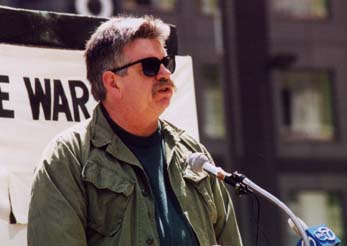 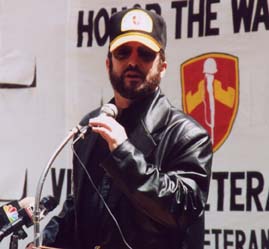 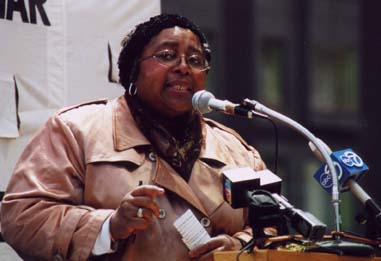 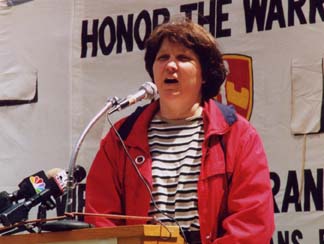 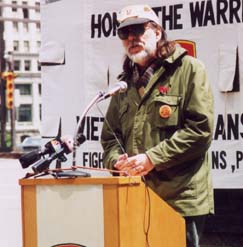 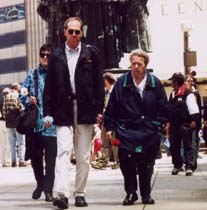 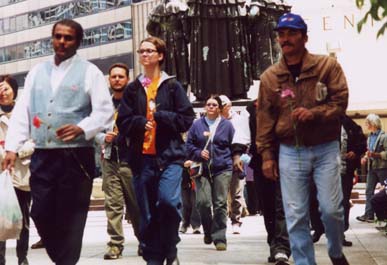 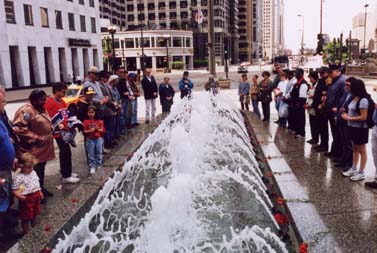
|


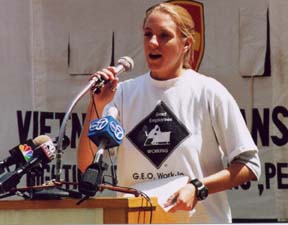 It was this sentiment, expressed by VVAW National Coordinator Joe Miller, that set the tone for this year's VVAW Memorial Day action at the Vietnam Veterans Memorial Fountain in Chicago. We gathered on May 29 to commemorate the 25th anniversary of the end of the war and to remember people who fell on both sides of the war. We also came to remember those who are still falling because of service-related illnesses and lack of affordable health care, as well as those who continue to fall as a result of American intervention abroad. This year we were blessed with beautiful weather, a large crowd, extensive media coverage, and truly inspiring speakers.
It was this sentiment, expressed by VVAW National Coordinator Joe Miller, that set the tone for this year's VVAW Memorial Day action at the Vietnam Veterans Memorial Fountain in Chicago. We gathered on May 29 to commemorate the 25th anniversary of the end of the war and to remember people who fell on both sides of the war. We also came to remember those who are still falling because of service-related illnesses and lack of affordable health care, as well as those who continue to fall as a result of American intervention abroad. This year we were blessed with beautiful weather, a large crowd, extensive media coverage, and truly inspiring speakers.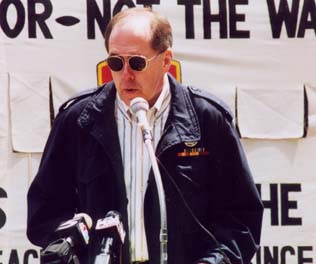 Joan Davis, now a high school teacher, was active in the anti-war movement at the University of Wisconsin at Madison from 1968 to 1974 while her future husband, Bill Davis, was fighting in Vietnam. "Something we learned from that struggle is that people can effect change."
Joan Davis, now a high school teacher, was active in the anti-war movement at the University of Wisconsin at Madison from 1968 to 1974 while her future husband, Bill Davis, was fighting in Vietnam. "Something we learned from that struggle is that people can effect change."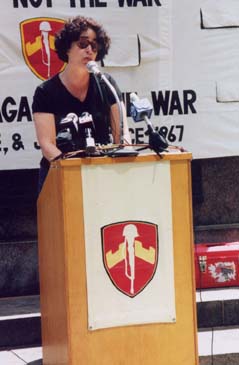 Jeanne Douglas, a Department of Veterans Affairs (VA) team leader and Co-Coordinator of the Homeless Veterans Stand Down, spoke about health care. She told us "stories that might give us some hope" in an era in which, as more World War II veterans die and the population the VA serves declines, so does VA funding
Jeanne Douglas, a Department of Veterans Affairs (VA) team leader and Co-Coordinator of the Homeless Veterans Stand Down, spoke about health care. She told us "stories that might give us some hope" in an era in which, as more World War II veterans die and the population the VA serves declines, so does VA funding